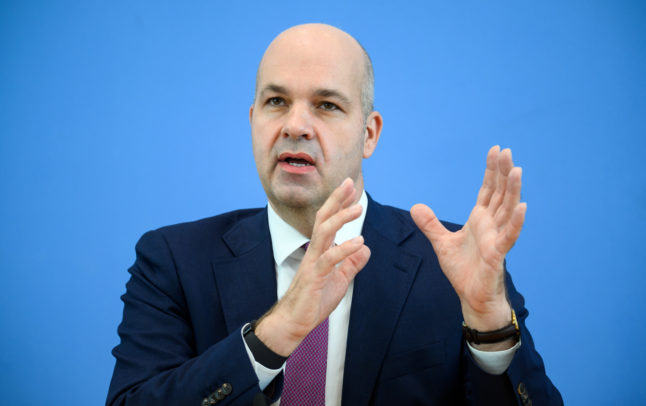Should Germany provide more energy relief to middle-income households?

With the new gas levy arriving this autumn, economists in Germany are calling for a new relief package to support mid-range earners with their energy bills.
One idea on the table is to provide an "energy fund" of €100 per person that would be paid out monthly for the next 18 months.
This, according to the president of the German Institute for Economic Research, Marcel Fratzscher, would be the "best instrument" for relieving low- and middle-income households during the energy crisis.
In October, the government will allow energy suppliers to add a levy of around 2.4 cents per kilowatt hour of gas onto customers' energy bills. This will see bills for an average 160 square metre family home go up by around €556 per year, while people living in 50-square-metre flats could see their costs rise by around €120-170 annually.
The gas levy is designed to help struggling energy firms recoup the cost of replacing cheap Russian gas, deliveries of which have been dwindling in recent months. In addition, energy companies will be allowed to pass a proportion of future excess costs onto consumers.
READ ALSO: EXPLAINED: How much will Germany’s gas levy cost you?
With household energy bills likely to triple or even quadruple, economists are arguing that more relief is urgently needed - and not only for those on the lowest incomes.
Chancellor Olaf Scholz (SPD) said last week that the government wants to assist working people who have no savings to fall back on and who cannot easily cope with the increased energy costs.
"This applies to quite a lot of citizens," Scholz said. "I am concerned with those who earn €2800, €3200 or €4000 gross per month, for whom these are all major challenges."
According to economist Fratzscher, this group includes more than one in five people in Germany.

Marcel Fratzscher, president of the German Institute for Economic Research, speaks at an event in Berlin. Photo: picture alliance/dpa | Bernd von Jutrczenka
"These are mainly people in the low-wage sector, which is unusually large in Germany, and also many pensioners," he told DPA. They tend not to have savings but at the same time don't receive support from the state.
For this reason, soaring inflation and high energy bills are likely to hit this middle-income group particularly hard.
READ ALSO: Germany pledges inflation relief tax package worth €10 billion
"We already have a strong social imbalance among this group as well," Fratzscher said. "This can be seen, for example, in the increase in the number of people who are over-burdened with debt."
"Politicians must now urgently implement a third relief package that relieves this group as a top priority," he added.
For Sebastian Dullien, scientific director of the Macroeconomic Policy Institute of the Hans Böckler Foundation, a second energy lump sum paid out in December would be the preferred option for relieving households.
This would follow the €300 lump sum in September but also take into account groups that were overlooked in the last energy relief package, such as pensioners who don't receive housing benefit.
"Another good option would be to introduce a gas price cap for a basic level of consumption per household," Dullien told DPA.
'Left in the dark'
In the summer press conference last week, Scholz reiterated his plans for a third energy relief package in autumn. However, he has so far refused to give concrete details about the measures included, stating that these are still being discussed within the coalition.
Social organisations are calling on the government to announce any new measures before the gas levy is introduced on October 1st.
READ ALSO: Germany’s Scholz pledges more relief for lowest earners
"The traffic light government has no time left to argue," Social Welfare Federation (VdK) president Verena Bentele told the Rhein-Neckar-Zeitung on Wednesday. "We need a solution by September."
Ursula Engelen-Kefer, vice-president of the German Social Welfare Association (SoVD), told the Neue Osnabrücker Zeitung that the government should roll out support soon to avoid social unrest in autumn.
"We cannot impose more and more burdens on the vast majority of society and at the same time leave them in the dark about how they will be supported," she said. "It is crucial that the federal government quickly decides on relief measures that will directly reach the people".
Comments
See Also
One idea on the table is to provide an "energy fund" of €100 per person that would be paid out monthly for the next 18 months.
This, according to the president of the German Institute for Economic Research, Marcel Fratzscher, would be the "best instrument" for relieving low- and middle-income households during the energy crisis.
In October, the government will allow energy suppliers to add a levy of around 2.4 cents per kilowatt hour of gas onto customers' energy bills. This will see bills for an average 160 square metre family home go up by around €556 per year, while people living in 50-square-metre flats could see their costs rise by around €120-170 annually.
The gas levy is designed to help struggling energy firms recoup the cost of replacing cheap Russian gas, deliveries of which have been dwindling in recent months. In addition, energy companies will be allowed to pass a proportion of future excess costs onto consumers.
READ ALSO: EXPLAINED: How much will Germany’s gas levy cost you?
With household energy bills likely to triple or even quadruple, economists are arguing that more relief is urgently needed - and not only for those on the lowest incomes.
Chancellor Olaf Scholz (SPD) said last week that the government wants to assist working people who have no savings to fall back on and who cannot easily cope with the increased energy costs.
"This applies to quite a lot of citizens," Scholz said. "I am concerned with those who earn €2800, €3200 or €4000 gross per month, for whom these are all major challenges."
According to economist Fratzscher, this group includes more than one in five people in Germany.

"These are mainly people in the low-wage sector, which is unusually large in Germany, and also many pensioners," he told DPA. They tend not to have savings but at the same time don't receive support from the state.
For this reason, soaring inflation and high energy bills are likely to hit this middle-income group particularly hard.
READ ALSO: Germany pledges inflation relief tax package worth €10 billion
"We already have a strong social imbalance among this group as well," Fratzscher said. "This can be seen, for example, in the increase in the number of people who are over-burdened with debt."
"Politicians must now urgently implement a third relief package that relieves this group as a top priority," he added.
For Sebastian Dullien, scientific director of the Macroeconomic Policy Institute of the Hans Böckler Foundation, a second energy lump sum paid out in December would be the preferred option for relieving households.
This would follow the €300 lump sum in September but also take into account groups that were overlooked in the last energy relief package, such as pensioners who don't receive housing benefit.
"Another good option would be to introduce a gas price cap for a basic level of consumption per household," Dullien told DPA.
'Left in the dark'
In the summer press conference last week, Scholz reiterated his plans for a third energy relief package in autumn. However, he has so far refused to give concrete details about the measures included, stating that these are still being discussed within the coalition.
Social organisations are calling on the government to announce any new measures before the gas levy is introduced on October 1st.
READ ALSO: Germany’s Scholz pledges more relief for lowest earners
"The traffic light government has no time left to argue," Social Welfare Federation (VdK) president Verena Bentele told the Rhein-Neckar-Zeitung on Wednesday. "We need a solution by September."
Ursula Engelen-Kefer, vice-president of the German Social Welfare Association (SoVD), told the Neue Osnabrücker Zeitung that the government should roll out support soon to avoid social unrest in autumn.
"We cannot impose more and more burdens on the vast majority of society and at the same time leave them in the dark about how they will be supported," she said. "It is crucial that the federal government quickly decides on relief measures that will directly reach the people".
Join the conversation in our comments section below. Share your own views and experience and if you have a question or suggestion for our journalists then email us at [email protected].
Please keep comments civil, constructive and on topic – and make sure to read our terms of use before getting involved.
Please log in here to leave a comment.